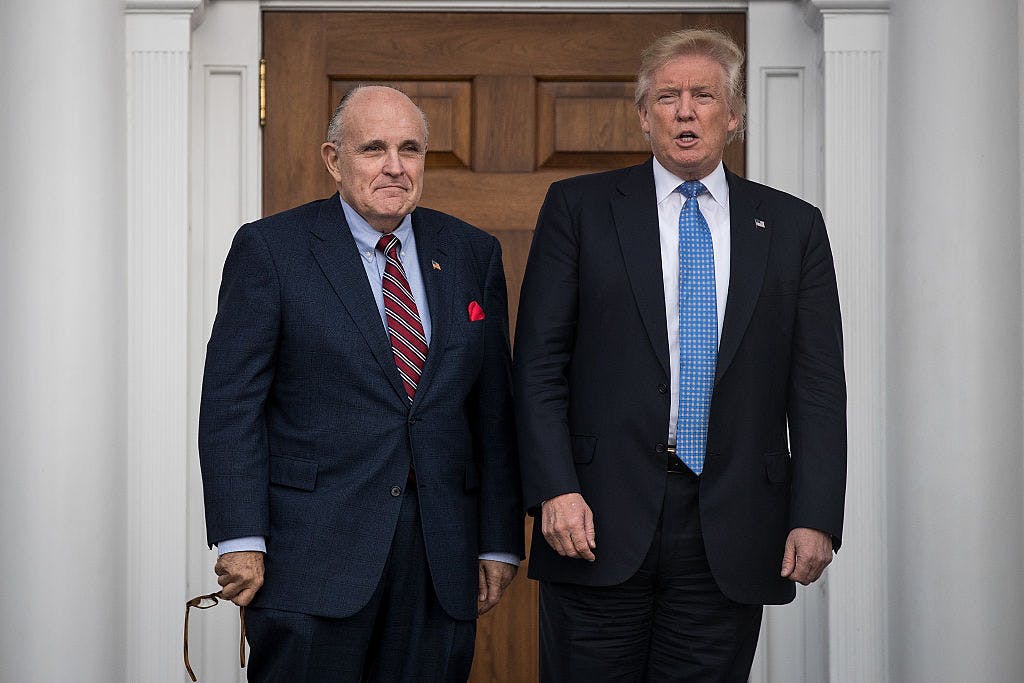Could Rudolph Giuliani’s Drinking Send Trump to Prison?
Jack Smith is allegedly homing in on whether the former president knew that the former mayor was not sober when he dispensed legal advice, an accusation Giuliani denies.

The admission, tucked into the vast amount of footage surfaced by the January 6 commission, that Mayor Giuliani could have been in his cups on Election Night 2020 could make a difference in whether President Trump spends time behind bars.
The inquiry into Mr. Giuliani’s inebriation came from Jason Miller, a senior adviser to Mr. Trump. The adviser told lawmakers, “I think the mayor was definitely intoxicated, but I do not know his level of intoxication when he spoke with the president” on November 3, 2020.
Mr. Giuliani denied that allegation last summer, noting that he “REFUSED all alcohol that evening,” and that he was “disgusted and outraged at the outright lie.” He added that his “favorite drink” is Diet Pepsi. Mr. Trump’s campaign manager, Bill Stepien, seconded Mr. Miller’s assessment that the former mayor was drunk.
The journalist Michael Wolff, who’s written multiple best-selling books about Mr. Trump, told MSNBC that Mr. Giuliani was so drunk on election night that White House staff was worried he’d smash historic White House china. Mr. Trump’s staff, Mr. Wolff reported in his book on the final days of the Trump administration, believed Mr. Giuliani was always buzzed and was giving the president bad information.
Mr. Trump, according to Mr. Wolff, thought the same thing. “In the days after Giuliani’s return, Trump, in a nearly reflective or perhaps slightly shamed moment, explained to a caller that he knew Rudy took a drink too many, and that he was a loose cannon, and that he said a lot of s— that was not true,” Mr. Wolff wrote in his book. “But Rudy would fight. He could be counted on to fight even when others wouldn’t. And, too, he would work for free.”
Now, a report from Rolling Stone alleges that Special Counsel Jack Smith, who is prosecuting Mr. Trump for both the storage of documents at Mar-a-Lago and his actions on January 6, 2021, “have asked questions about how seemingly intoxicated Giuliani was during the weeks he was giving Trump advice on how to cling to power.”
The dispatch in Rolling Stone, which cites a “source who’s been in the room with Smith’s team, one witness’s attorney, and a third person familiar with the matter,” conveys that Mr. Smith “probed how drunk witnesses and others believed Giuliani to be during specific and consequential moments of the tumultuous Trump-Biden presidential transition.”
The status of Mr. Giuliani’s blood alcohol level might be salacious, but it also is legally salient. If Mr. Trump — who, famously, does not drink alcohol after his brother died of alcoholism — knew that the former mayor was not sober when he dispensed legal advice, it could undercut his reliance on an “advice of counsel” defense, a legal theory that appears set to take center stage.
Some of the high-profile lawyers who once held sway in the former president’s orbit have evinced skepticism. Attorney General Barr said of the defense: “I don’t think that dog is going to hunt.”
What is legally salient, though, is not so much what Messrs. Barr and Short thought but what Mr. Trump reckoned with respect to his representation. That could be why Mr. Smith twice tucks into his indictment the allegation that the former president said that Co-Conspirator 3, identified as Sidney Powell by CNN, “sounded crazy.”
A former aide to Mr. Trump, Hope Hicks, told the January 6 committee that her boss found that Ms. Powell’s assessments of more exotic forms of voter fraud were “humorous” and didn’t take them “seriously.” If Mr. Trump was laughing, the claim that he took the advice seriously will be difficult to hold up in court.
That is where Mr. Giuliani’s purported affinity for the bottle could come into play. The Supreme Court has held that a defendant who “reasonably” relies on advice of counsel may “not be convicted of a crime which involves willful and unlawful intent.” Mr. Trump’s charges carry that requirement.
So, too, do the ones District Attorney Fani Willis of Fulton County has handed up against Mr. Giuliani. While inebriation is not usually a defense in the realm of criminal law, it can be used to surface a defendant’s state of mind.
A defense theory based on reliance on counsel like the one Mr. Trump could be readying is usually marshaled to indicate good faith on the part of a defendant, rather than as an autonomous argument for acquittal. Once deployed, attorney-client privilege is waived, meaning that communications between counsel and client enter into evidence.
Mr. Smith has not, at least not yet, indicted Mr. Giuliani, confirmed by NBC News as Co-Conspirator 1 in the charging document. This could indicate that the prosecutor is not finished assessing his role in the alleged conspiracy. Mr. Giuliani has met with Mr. Smith’s office.
If Mr. Trump had reason to believe that Mr. Giuliani was compromised by alcohol, that could undercut the former president’s argument that he “reasonably” relied on the former mayor. That in turn could be material to Mr. Smith’s case, which could stand or fall on the question of what Mr. Trump believed and when he believed it.
Mr. Giuliani did not immediately respond to a request for comment.

